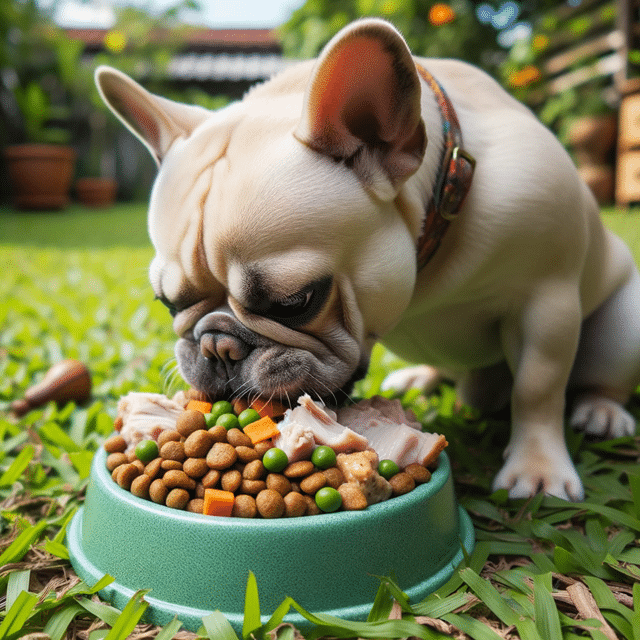Best food for French bulldogs?: You’re gazing at your adorable French Bulldog, pondering what’s best to feed them. It’s not always easy, is it? Don’t fret, you’re not alone in this! This article is your ultimate guide, packed with top wet and dry food recommendations, homemade meal ideas, and essential supplements. Plus, we’ll share feeding guidelines to keep your Frenchie healthy and happy. Let’s dive in and discover the best food options for your cherished pet.
Understanding French Bulldog Nutrition
Why should you care about your French Bulldog’s nutrition? Nutrition is the foundation of your dog’s health and the right diet can significantly impact their overall wellbeing. Nutritional deficiencies can lead to various health problems, including poor coat condition, weakened immune system, and decreased energy levels.
Your French Bulldog’s diet should meet their breed specific requirements. This breed is known for its adorable squashed face and bat-like ears, but it also has unique dietary needs due to its size and specific health predispositions. For instance, French Bulldogs are prone to obesity, which can be mitigated by a balanced, portion-controlled diet.
Understanding potential allergy triggers in your dog’s diet is also crucial. French Bulldogs are notorious for their sensitive stomachs and they often have food allergies or intolerances. Common culprits include grains, dairy, and certain proteins. By identifying and avoiding these triggers, you can prevent uncomfortable symptoms like itching, diarrhea, and vomiting.
Lastly, consider the long-term health impact of your Frenchie’s diet. An unbalanced diet can lead to chronic diseases such as diabetes, heart disease, and joint problems. On the other hand, a nutritious, balanced diet can help your pup maintain a healthy weight, support their immune system, and promote longevity.
Best Wet Food Options
When it comes to feeding your Frenchie, you’ll find a range of wet food options that can cater to their unique dietary needs. Wet food, particularly the canned variety, offers numerous benefits that dry food cannot match. Not only does it provide your pup with the necessary hydration, but it’s also a great picky eater solution. The high moisture content and appealing texture can make mealtime more enjoyable for your Frenchie.
Choosing the right wet food brand is crucial. Here are four top-rated brands that offer grain-free options:
- Wellness Core: Known for their high-quality ingredients, Wellness Core offers a grain-free wet dog food that’s rich in protein and low in carbohydrates.
- Blue Buffalo Homestyle Recipe: This brand offers grain-free options made with real meat, vegetables, and fruits. It’s a good source of omega 3 and 6 fatty acids, which are beneficial for your Frenchie’s skin and coat.
- Natural Balance L.I.D. Limited Ingredient Diets: Perfect for Frenchies with food sensitivities, this brand offers grain-free formulas with a limited number of protein and carbohydrate sources.
- Merrick Grain-Free: This brand features grain-free recipes with high-quality meat as the first ingredient. It also includes essential vitamins and minerals for overall health.

Top Dry Food Recommendations
Transitioning from wet food, your consideration of dry food for your Frenchie opens up a whole new spectrum of nutritional possibilities. Dry food often provides a higher calorie count per serving, making it perfect for active, growing French Bulldogs.
One essential factor to consider is allergen-free options. French Bulldogs are known for their sensitive stomachs, so picking a brand that offers food free from common allergens like soy, wheat, and dairy can save your pet a lot of discomfort. Brands such as Blue Buffalo and Nutro offer excellent allergen-free formulas.
Another feature to look for is the grain-free benefits. Grain-free food can be a good choice if your Frenchie has a grain allergy or if you’re just seeking a diet closer to what their ancestors would have eaten. Acana and Taste of the Wild are popular brands that offer grain-free options.
A food brand comparison is crucial to understand the nutritional value each brand provides. Consider the ingredient list, protein sources, and added vitamins and minerals. Merrick and Orijen excel in these aspects, with high-quality ingredients and balanced nutrition.
Let’s not forget about the dental health impact. Dry food can help keep your Frenchie’s teeth clean by reducing plaque and tartar build-up. Brands like Hill’s Science Diet and Royal Canin have specially designed kibble for dental health.
Homemade Meal Ideas
If you’re looking to incorporate some homemade meals into your Frenchie’s diet, it’s important to ensure that these meals are nutritionally balanced and suitable for their specific needs. A well-crafted homemade meal can provide your pet with the necessary nutrients while also catering to their taste preferences. However, it’s not as simple as tossing together a few of your dog’s favorite ingredients. You need to consider allergy considerations, meal proportioning, ingredient sourcing, and recipe inspiration.
- Allergy Considerations: French Bulldogs are often prone to food allergies. Common allergens include grains, dairy, and certain proteins. It’s crucial to know your dog’s allergens and avoid these ingredients in your homemade meals.
- Meal Proportioning: Overfeeding can lead to obesity, a common issue in French Bulldogs. It’s essential to understand the right portion sizes for your Frenchie’s weight, age, and activity level.
- Ingredient Sourcing: Quality matters. Aim to use fresh, high-quality ingredients in your homemade meals. Organic produce and lean meats are often recommended.
- Recipe Inspiration: There are countless dog-friendly recipes available online to inspire your homemade meals. Ingredients like lean meats, vegetables, and sweet potatoes can be combined in various ways to create nutritious and delicious meals.
Essential Supplements for Frenchies
While you’re whipping up homemade meals for your Frenchie, don’t forget to add in essential supplements to round out their nutritional needs. Supplement safety should be your top priority, as not all products on the market are suitable for every dog. It’s best to consult a veterinarian before introducing any new supplement to your dog’s diet.
One supplement that should be on your radar is fish oil. It’s a boon for improving your Frenchie’s skin and coat health, as well as for easing inflammation associated with allergies. However, be aware of the allergy risks. Some dogs may have a negative reaction to fish oil, so always start with a small dose to gauge your pet’s response.
Digestive enzymes and probiotics are also beneficial supplements. Digestion benefits include more efficient nutrient absorption, less gas, and fewer bouts of diarrhea or constipation. Just like with fish oil, it’s important to start with a modest dose and gradually increase it, monitoring your dog for any signs of discomfort or adverse reactions.
Vitamins are also crucial for maintaining your Frenchie’s health. Particularly, vitamins A, C, and E are vital for their immune system, skin, and coat health. The vitamin importance lies in its ability to prevent a variety of health issues, including poor vision, weakened immune system, and dull coats. However, remember that too much of a good thing can be harmful. Overdosing on vitamins can lead to toxicity, so ensure you’re giving your Frenchie the recommended amount.
Feeding Guidelines and Tips
When it comes to feeding your Frenchie, it’s crucial to follow specific guidelines for their health and happiness. The careful balancing of portion control, meal frequency, allergy considerations, and the importance of hydration should all be factored in.
- Portion Control: It’s not uncommon for French Bulldogs to overeat if given the chance. Therefore, maintaining strict portion control is key to prevent weight gain and obesity. Measure your Frenchie’s meals based on their weight, age, and activity level. Typically, adult Frenchies require about 25 to 30 calories per pound of body weight per day.
- Meal Frequency: Rather than providing one large meal, it’s preferable to spread your Frenchie’s food intake over two or three meals a day. This can help manage hunger and maintain stable energy levels throughout the day.
- Allergy Considerations: French Bulldogs are prone to food allergies, which can cause skin irritations, digestive issues, and other health problems. Common allergens include grains, dairy, and certain proteins. Always introduce new foods gradually and watch for signs of an allergic reaction.
- Hydration Importance: Like all dogs, Frenchies need to stay hydrated, particularly in hot weather or after exercise. Always provide fresh, clean water, and if your dog doesn’t seem to drink enough, consider adding wet food to their diet to boost moisture intake.

Frequently Asked Questions
What Are Some Common Food Allergies in French Bulldogs?
Identifying allergens in your French bulldog’s diet is crucial. They’re often allergic to grains, dairy, and certain proteins. Allergy testing can pinpoint the exact cause. If it’s food-related, hypoallergenic diets are available. You can also use natural remedies to soothe their symptoms. Remember, every dog is unique. What works for one might not work for another. Always consult with your vet before making any dietary changes.
Can French Bulldogs Eat a Vegan or Vegetarian Diet?
While you might enjoy the vegan benefits, it’s not the same for your French Bulldog. They can technically survive on plant-based proteins, but there’s a high risk of nutrient deficiencies. Canines, especially French Bulldogs, require certain nutrients found primarily in meat. So, if you’re considering a vegan or vegetarian diet for your pup, you’ll need to think about supplement requirements. It’s no easy task and it’s crucial to consult with a vet before making such a significant dietary change.
How Do I Switch My French Bulldog’s Food Brand Without Causing Digestive Issues?
To switch your French Bulldog’s food brand without causing digestive issues, you’ll need to make a gradual transition. Start by mixing a small amount of the new food with the old. Increase the new food’s proportion gradually over 7-10 days. Monitor for food sensitivity symptoms during this time. Compare the old and new brands’ nutritional content. Consider dietary supplements if necessary. Remember, every dog is unique; what works for one might not work for another.
Is There a Certain Time of Day That Is Best to Feed My French Bulldog?
Just like us humans, your French Bulldog doesn’t need to eat at a specific time. However, it’s crucial to maintain a consistent feeding frequency. Regular meal timing helps with digestion and portion control. Usually, feeding your French Bulldog twice a day, morning and evening, works well. Ensure not to overfeed them, especially with evening snacks. Adjust the schedule as per your dog’s energy levels and digestion.
How Can I Prevent My French Bulldog From Becoming Overweight?
To prevent your French Bulldog from becoming overweight, it’s essential to focus on portion control and maintain regular exercise routines. Overfeeding can lead to obesity risks, so monitor your pup’s weight closely. Consult with your vet about the right amount of food and suitable exercises. Remember, keeping your French Bulldog active and on a balanced diet is key to maintaining a healthy weight.
Conclusion
In wrapping up, don’t skimp on your Frenchie’s diet! From top-notch wet and dry food options to home-cooked delights, there’s a smorgasbord of choices. Remember, the right supplements can jazz up their health too. Follow the feeding guidelines to keep them in tip-top shape. After all, keeping your Frenchie happy is a piece of cake when you know exactly what to put in their bowl!

